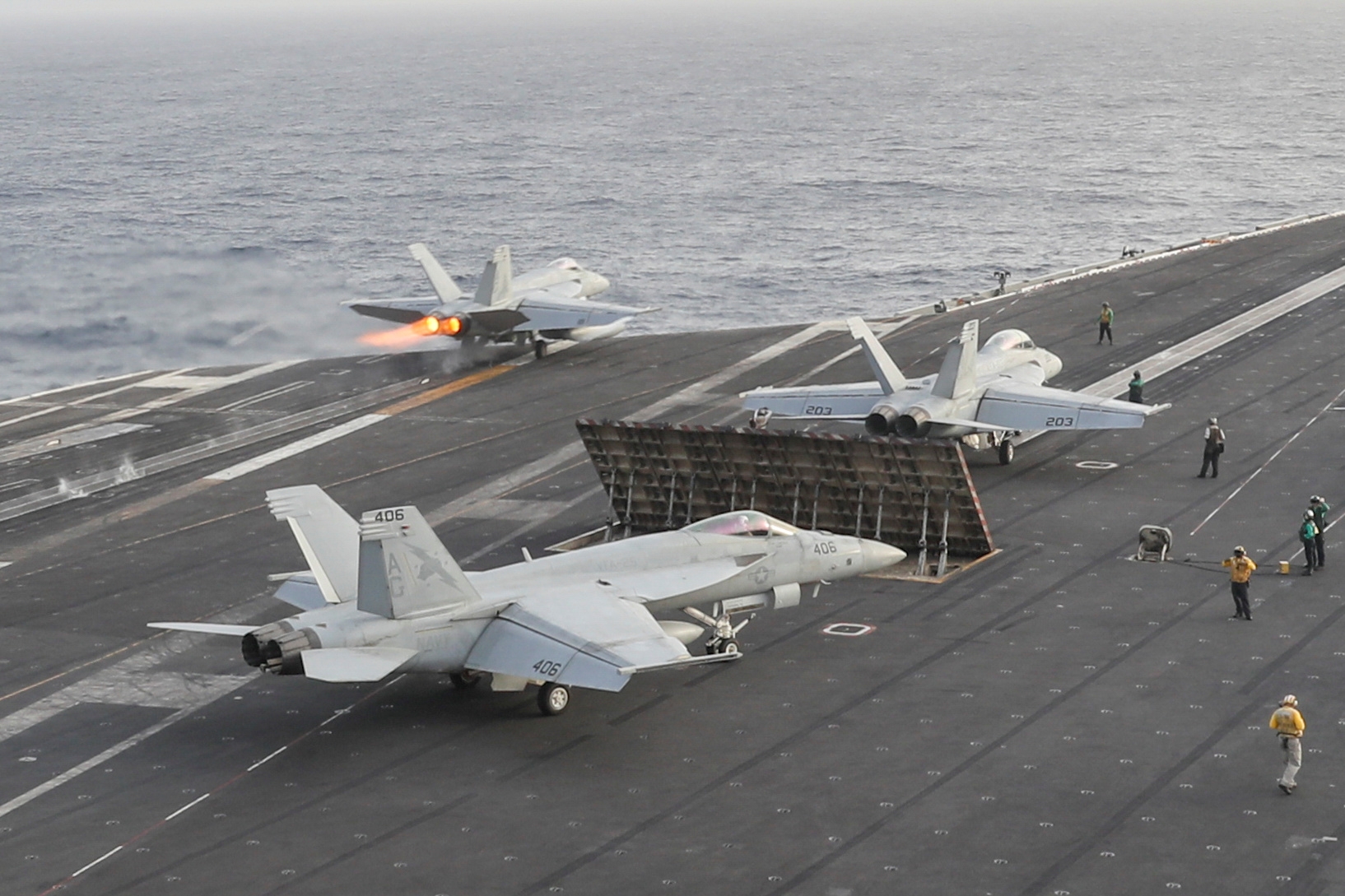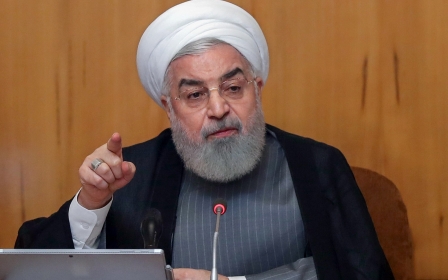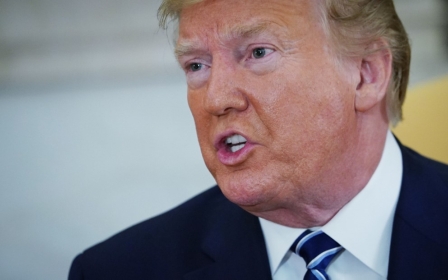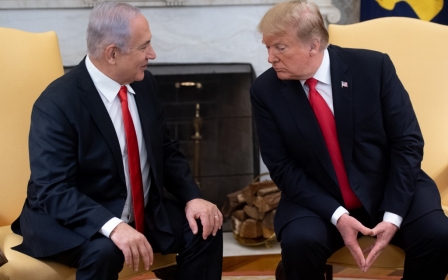US House passes amendment to restrict Trump's ability to attack Iran

US lawmakers approved a measure that would force President Donald Trump to seek congressional approval before ordering military strikes against Iran.
The amendment passed in a 251-170 vote in the House of Representatives on Friday, with many Republicans joining the Democratic majority in the attempt to limit the US president's war-making power.
The legislation still needs to be approved by the Senate before making it to the president's desk, and Trump is almost certain to veto it.
Still, it highlights a growing unease with war across the US political spectrum, as the legislative effort was led by Congressman Ro Khanna, a left-wing Democrat, and his Republican colleague Matt Gaetz, a staunch conservative who supports Trump.
The amendment targets the National Defense Authorization Act (NDAA), which determines the Pentagon's budget. It comes three weeks after Trump ordered, then cancelled, military strikes against Iran, minutes before their launch.
A timeline of US-Iran tensions
+ Show - HideTensions have skyrocketed between the Washington and Tehran since US President Donald Trump announced last May that he was pulling out of the 2015 Iranian nuclear deal.
Here's a timeline of key events that have led to, and marked, the recent escalation:
8 May 2018: US President Donald Trump announces plans to pull out of a 2015 nuclear deal with Iran. Under that agreement, the Iranian government agreed to curb its nuclear programme in exchange for a lifting of international sanctions.
Trump also says Washington will reimpose "the highest levels of economic sanctions" on Tehran.
5 November 2018: The US reimposes sanctions on Iran's oil, banking and transport sectors. At the same time, Trump says he wants to gradually impose sanctions on the Iranian oil industry, citing concerns about upsetting energy markets and causing global price spikes.
8 April: The Trump administration blacklists Iran's elite military force, the Islamic Revolutionary Guard Corps (IRGC). The move marks the first time Washington has formally labelled another country's military a terrorist group.
30 April: Iranian President Hassan Rouhani signs a bill into law that declares all US troops in the Middle East as terrorists, and defines the US as a state-sponsor of terrorism.
2 May: The US stops issuing waivers to countries that import oil from Iran. Those waivers had allowed certain states, including Turkey, China, Japan, India and South Korea, to keep buying Iranian oil, despite American sanctions - and provided a lifeline for Tehran.
6 May: US National Security Adviser John Bolton announces that the Trump administration is deploying an aircraft carrier, as well as ships and bombers, to the Gulf. The move was meant to send a "clear and unmistakable message" to the Iranian government, Bolton said, amid intelligence reports that Tehran was planning attacks against American troops in the region.
7 May: Iran says it plans to withdraw from parts of the 2015 nuclear agreement with major world powers. The move comes one year after US President Donald Trump withdrew from the deal.
8 May: The Trump administration announces a new round of economic sanctions that will target Iran's metals trade - iron, steel, aluminium and copper, specifically.
9 May: As the drums of war began to beat louder in certain circles in Washington, Trump tells reporters that he "would like to see them [Iran] call me" - a sign the US president is perhaps seeking to de-escalate the situation.
12 May: The United Arab Emirates says four oil tankers were damaged in "acts of sabotage" off the coast of Fujairah, just outside the Strait of Hormuz. The UAE did not assign blame for the incident, but said it would launch an investigation into what happened.
13 May: Mike Pompeo makes a surprise visit to Brussels, where he seeks to get European leaders on board with Washington's "maximum pressure" strategy against Tehran. The US secretary of state gets a lukewarm reception, however, with the European Union's foreign policy chief instead urging the US to show "maximum restraint".
14 May: Iran's Supreme Leader Ali Khamenei says the country will not go to war with the US. "Neither we nor they - who know war will not be in their interest - are after war," Khamenei says.
15 May: Anwar Gargash, the UAE's minister of state for foreign affairs, says the country is committed to "de-escalation" with Iran, while refusing to assign blame for the 12 May "sabotage" of the oil tankers.
That same day, the US orders non-emergency government employees to leave Iraq, citing fears of an imminent attack by Iranian-backed proxies in that country.
19 May: A Katyusha rocket is fired into Baghdad's Green Zone, an area that houses government offices and foreign diplomatic missions, including the US embassy in Iraq.
21 May: A previously unknown Iraqi group claims responsibility for the rocket fired into the Green Zone. The Operations of Martyr Ali Mansour says the attack is retaliation for Trump's decision to pardon a soldier who killed an Iraqi detainee in 2009.
24 May: Washington announces plans to deploy 1,500 additional troops to the Middle East to counter Iranian threats, a decision Iran blasted as "extremely dangerous".
28 May: US National Security Adviser John Bolton says the attack on four vessels off the Emirati coast was caused by "naval mines almost certainly from Iran".
30 May-1 June: Saudi Arabia hosts a summit in Mecca to discuss recent tensions with Iran. On the eve of the talks, Riyadh blasts what it called Iranian "interference" in the region and demanded "firmness" over attacks in the Gulf.
7 June: The US imposes sanctions on Iran's largest petrochemicals holding group, accusing Persian Gulf Petrochemical Industries Company of providing financial support to an engineering firm with ties to the IRGC.
13 June: Two oil tankers suffer damage after an unspecified attack in the Gulf of Oman. Hours after the incident, US Secretary of State Mike Pompeo points the finger at Iran, without providing evidence to back up his claim.
Iran immediately denies it was involved in the attacks.
14 June: The head of the United Nations calls for an independent investigation into the incidents in the Gulf of Oman.
Earlier in the day, US Central Command releases a video that it says shows Iranian IRGC members removing an unexploded mine from one of the damaged ships. That comes after Trump himself says the incident has Iran "written all over it".
Meanwhile, the owner of the Japanese vessel says crew members reported seeing objects flying towards them - which would appear to refute the US's version of events.
17 June: The US will send roughly 1,000 additional troops to the Middle East, Defense Secretary Patrick Shanahan announces.
20 June: Iran says it shot down a US military drone entering Iranian airspace near the Straits of Hormuz. A US official confirms that a drone was shot down but says it was in international airspace.
21 June: US President Donald Trump says he ordered and then aborted a military strike on Iran roughly 10 minutes before the operation took place.
Trump says he called off the strike after US generals reportedly told him the attack would kill 150 Iranians. The US operation was "not proportionate", the US president says.
24 June: The US imposes a new round of sanctions on Iran, this time targeting the country's supreme leader, Ayatollah Ali Khamenei.
25 June: Trump threatens Iran with "obliteration" if the country were to strike American targets. His comments come after Iranian President Hassan Rouhani called the White House "mentally retarded" and vowed that Tehran would not back down from US sanctions.
28 June: The US Senate votes down an amendment that sought to bar Trump from being able to declare war on Iran without authorisation from Congress.
4 July: A supertanker suspected of carrying Iranian crude oil to Syria in violation of EU sanctions is detained in Gibraltar. Senior Iranian officials deny claims the tanker was headed to Syria.
5 July: A senior Islamic Revolutionary Guard Corps (IRGC) commander suggests that Iran should seize a British oil tanker if the Iranian vessel detained off Gibraltar is not released immediately.
9 July: General Joseph Dunford, a top US general, announces plans to set up a coalition of allied countries willing to patrol key waterways in the Gulf region.
Dunford says the US military would provide command ships and surveillance technology, while its allies would escort ships and patrol the Strait of Hormuz and Bab el-Mandeb.
11 July: British officials say three Iranian boats attempted to "impede the passage" of a British oil tanker in Gulf waters, forcing a UK warship to intervene. Iran denies the accusation.
Meanwhile, Gibraltar police announce the arrest of the captain and chief officer of the Iranian supertanker on suspicion that the ship had breached EU sanctions on Syria on 4 July.
12 July: US lawmakers approve a measure that would force President Donald Trump to seek congressional approval before ordering military strikes against Iran.
16 July: Iran says it has ruled out entering into negotiations over its ballistic missile programme, directly contradicting statements made by US Secretary of State Mike Pompeo earlier that same day.
18 July: Trump says American warship USS Boxer downed an Iranian drone in the Strait of Hormuz. But top Iranian officials deny the report.
31 July: Washington imposes sanctions on Iran's Foreign Minister Zarif. Zarif tells Saudi Arabia that Iran is "ready for dialogue".
5 August: The UK becomes the first country to join Washington's maritime security mission in the Gulf.
8 August: Iran's defence minister warns of "disastrous repercussions" if Israel were to join the US maritime security coalition in the Gulf.
15 August: The US Justice Department issues a warrant for Iran's Grace 1 after Gibraltar says it is ready to release the tanker.
18 August: The Grace 1, renamed the Adrian Darya-1, is released from Gibraltar after a five-week standoff.
19 August: Bahrain joins the US-led mission in Gulf waters.
21 August: Australia becomes the third country to join Washington's maritime security mission in the Gulf.
27 August: US President Donald Trump and Iranian Foreign Minister Mohammad Javad Zarif both attended the G7 conference but do not meet.
28 August: The US Treasury Department issues sanctions against two networks it says are tied to Iran's missile proliferation programme. Meanwhile, the US's joint maritime security initiative in the Gulf officially launches.
3 September: France says it is prepared to offer Iran $15bn in credit lines to help ease Washington's economic pressure against the country - but the proposal hinders on US approval.
4 September: Iran's President Hassan Rouhani gives European powers another two months to save the 2015 nuclear deal, but warns that Iran is still preparing to breach the pact in ways that would have "extraordinary effects".
6 September: Two sources tell MEE that the Iranian oil tanker that was held by British authorities in Gibraltar for five weeks has delivered its cargo to Syria.
10 September: US President Donald Trump sacks national security adviser John Bolton, seen as the architect of recent US-Iran tensions. Meanwhile, the UK says Iran broke its promise by transferring oil to Syria aboard the Adrian Darya I several weeks after Gibraltar released the supertanker.
14 September: A coordinated drone attack strikes the heart of the Saudi oil industry, forcing the kingdom to shut down about half of its crude production.
The Houthi rebels claim responsibility, but US Secretary of State Mike Pompeo accuses Iran of leading the attack. Iran denies this.
15 September: The commander of Iran's Revolutionary Guards Corps Aerospace Force, Amir Ali Hajizadeh, says that all US bases and aircraft carriers in the Middle East are within range of Iranian missiles
A senior Iraqi intelligence official tells Middle East Eye that the Saudi strikes were carried out by Iranian drones launched from Hashd al-Shaabi militia bases in southern Iraq.
16 September: President Donald Trump says the US was "locked and loaded" against Iran and he was "waiting to hear from the kingdom as to who they believe was the cause of this attack, and under what terms we would proceed!"
17 September: US Vice President Mike Pence warns Tehran that Washington is ready for military confrontation and will not ease its pressure campaign against the Islamic Republic.
18 September: Saudi Arabia says there was "unquestionable evidence" that the attack on its oil facilities was sponsored by Iran and was launched from the north of the kingdom.
19 September: Iranian Foreign Minister Mohammad Javad Zarif says Iran does not want war, but warns the US that any attack on Iran would lead to "all-out war".
US Secretary of State Mike Pompeo responds to Zarif's comments, saying that Washington was searching for a peaceful solution to the conflict.
Congressional leaders have repeatedly warned the president against a military confrontation with Iran without the backing of lawmakers.
Trump has insisted that he doesn't need Congress's approval.
Last month, he told Hill.TV that he is cooperating with lawmakers on the US's Iran policy, but he added that he can legally bypass them.
"I do like keeping them abreast, but I don't have to do it legally," Trump said.
'Every available tool'
Last month, the Republican-controlled Senate rejected a similar effort that sought to limit the president's ability to strike Iran without the support of Congress.
'Constitutional rights aren’t optional and endless war isn’t inevitable'
- Ro Khanna, US congressman
On Friday, several advocacy groups, including liberal Jewish organisation J Street and the National Iranian American Council, welcomed the passage of the amendment.
The groups called on Congress to use "every available tool at its disposal" to prevent war with Iran.
"It's clear now more than ever that this White House, led in large part by National Security Adviser John Bolton, is determined to pursue maximum pressure to its ultimate conclusion of war with Iran," they said in a statement.
"But our Constitution provides that Congress, not Donald Trump, decides when and where the United States goes to war."
The amendments follows weeks of escalating tensions between Washington and Tehran, after US officials accused Iran of planning to attack American troops and interests in the Middle East.
Since then, Washington has blamed Iran for a series of attacks in the region, including targeting oil tankers in the Gulf - charges that Tehran denies.
On Friday, Khanna hailed the bipartisan support that the anti-war amendment received.
"This is the only way to stop Trump from starting another costly war. Constitutional rights aren't optional and endless war isn't inevitable," he wrote on Twitter.
"This is how we democratize our foreign policy and put an end to unconstitutional wars."
Still, Republican Congresswoman Liz Chenney warned late last month that the amendment is unconstitutional and threatens US security.
"Congress should never limit the president's ability to defend our nation," said Chenney, whose father, former Vice President Dick Cheney, was one of the lead architects of the Iraq war.
On Friday, Gaetz laughed off the congresswoman's criticism in an interview with Fox News.
"A Cheney wanting us to get into war - weird," Gaetz said.
Middle East Eye propose une couverture et une analyse indépendantes et incomparables du Moyen-Orient, de l’Afrique du Nord et d’autres régions du monde. Pour en savoir plus sur la reprise de ce contenu et les frais qui s’appliquent, veuillez remplir ce formulaire [en anglais]. Pour en savoir plus sur MEE, cliquez ici [en anglais].





